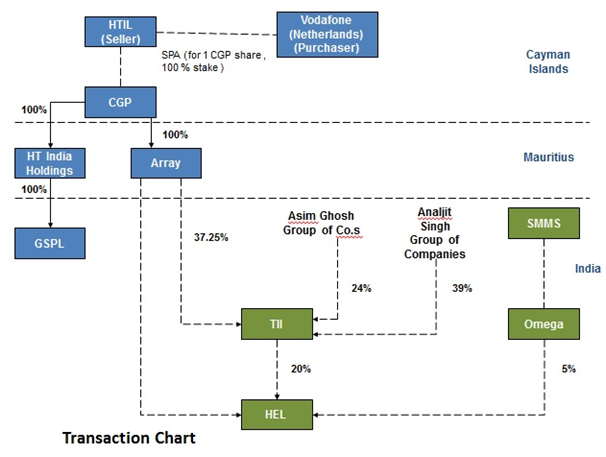This article is written by Abhyudaya Agarwal, Co-founder, iPleaders.
Advising on business structures is a crucial aspect of any corporate lawyer or in-house lawyer’s work. Once you start working in a law firm, many young lawyers are immediately given transactional work pertaining to fancy corporate structures. This kind of immersion is good, but quite daunting as associates are under pressure to deliver outcomes in very short deadlines. Just to give you a taste of things, I will share the simplest diagram for the Vodafone transaction that I could come up with (this is much simpler than the Supreme Court’s version as well), which looks like this:
This looks dazzlingly complex at first sight, but don’t get scared – you’ll start grasping these things easily once you understand some basic commercial principles. It is important to get a realistic view of things. For now, imagine this transaction being captured in 5 – 6 documents, the largest of which runs well over 100 pages. Imagine what would happen if you were asked to tweak just a couple of definitions / mechanisms in the transaction. You will also have to ensure that the change is correctly reflected across multiple contracts. This is not as simple as using the Ctrl + F button and replacing the terms. Using Google doesn’t give you the answer either, because you have to intelligently understand the different aspects of the transaction and how they are captured into the document. This is not like reading a huge case or academic article for your law school assignment – you need to be very precise and every nuance properly. Access to your network of seniors is relatively limited and you can only get broad guidance, but you have to eventually do the work by yourself. Once again, I am sharing this to give you a realistic view of things, not to scare you. If you figure this out, you will be able to understand, dissect and customize transactions like no one else and add tremendous value as a corporate lawyer.
We are going to figure out ways in which you can ease this struggle and beat initial law firm blues. We’ll start with how corporate lawyers use business structuring skills to add value to clients. Before you begin reading, beware the beginner’s pitfall – don’t skip sections just because you are familiar with the keywords. Just because these do not have specific section numbers or are not analysing a legal provision, it does not mean this is business or management advice. It is time to break the myth – this is hardcore corporate lawyer’s work. Now, let’s see 4 ways in which a corporate lawyer uses business structuring skills to add value to clients.
#1 – Advice on the structure to adopt
Depending on the nature of the client and the business sought to be started, you will have to select a structure for the client, and often advise the client on which structure is preferable, over other alternatives that he or she may be evaluating. For example, consider venture capital funds, banks, real estate companies, product / service businesses, non-profit organizations, branch offices, subsidiaries or joint ventures – they cannot use the same business vehicle. As a commercial lawyer, your inputs and familiarity with issues help greatly in inspiring a client’s confidence when you communicate with a client.
Lawyers are used to reading the statute and case law but are typically not comfortable with this approach (which is more open-ended), so some prior training helps in this regard.
Want to try out a sample? Read this post to understand the differences between an LLP and a private limited company.
For example, which is an optimal structure for a venture capital fund? What are RBI regulations for opening branch offices for foreigners? Are approvals required? Which is the ideal vehicle for a captive outsourcing subsidiary?
At this level, many businesses also require advice (in the form of a memorandum, etc.) on how tax laws will apply to their operations, and they will use that choice to determine an appropriate business structure. Based on your advice, even the manner in which profits are distributed may be suitably adapted so that the impact of tax laws is not too onerous.
(Don’t worry if some of this sounds like Greek or Latin to you – this is how it starts anyway. The challenge is in learning how to tackle these questions beforehand so that you are not stumped in a law firm.)
#2 – Kickstarting operations and incorporation-related work
Your next task is to help the business with certain preliminary issues, such as applying for an initial set of licenses and registrations required to kickstart operations – these will include Shops and Establishment licence, factories act registration for manufacturing units, labour and tax (income tax, VAT, Central Sales Tax and service tax, as applicable) registrations, intellectual property registrations (if necessary) and sectoral registrations. Many law firms engage local counsels or consultants for this work.
However, the corporate lawyer’s input will be important on which registrations are necessary, having regard to the nature of the business. Often, clients may require a step-chart explaining the different steps to be taken in advance. A format of step chart is shown below (you can zoom the image for a clearer view of the format).
Image:Step chart for incorporation and setting up a new business for a domestic venture (we assumed that the proposed directors have a director’s identification number and a digital signature already. Details about the incorporation process are available in the diploma course)
#3 – Advising on how the contract is drafted, drafting the contract and negotiation
As part of the incorporation work, you will have to draft an incorporation document, which could take the shape of an LLP agreement, a shareholders agreement (followed up with an articles of association), joint venture agreement, a trust deed, a memorandum defining the relationship as an ‘association of persons’, etc.
Value addition is important at this stage – top law firms easily charge a few lakhs for business incorporation and commencement, while standard off-the-shelf services like eLagaan or Vakilsearch will incorporate your business in INR 10,000 only. What is the reason for this difference and why will a client be willing to pay such a heavy amount for incorporation?
The answer lies in the level of service expected from a corporate law firm, which will be of an entirely different nature – a client will expect a highly customized incorporation document which is tightly worded and reflects the commercial intent very precisely. A lawyer will have to bear very specific directives in mind while filing the document. The documents are far more detailed than a simple partnership agreement that you will obtain from the internet.
You can’t simply pick up a template and replace the name of the parties – you will miss out on key issues arising out of the contract, and most seniors and clients will rubbish your work if you attempt that. The second trick is in being able to identify all the major risk, without being fussy – many clients feel that lawyers spend too much billable hours of nit-picking.
As a commercial lawyer your role is to identify gaps and risks that could potentially arise in course of the business relationship, ask ‘what if’ questions and address them in the document. For example, “What if a party’s representation is not true? What if the business fails to meet milestones?” You will find a lot of these questions in the checklist. You may even help your clients identify issues for negotiation.
#4 – Relevance of business structuring expertise in investments and business acquisitions
Structuring expertise helps significantly in investment and acquisition transactions, especially during due diligence. For example, at the time of conducting due diligence for an investor or an acquirer, a corporate lawyer will typically require copies of all incorporation and business- registrations from the investee company.
Similarly, consider there is a regulatory update from RBI specifying that a certain document (e.g. a valuation certificate) is needed if a party contributes capital in kind to a joint venture. If you know about this, you will be careful to insert a clause which requires necessary certificates as ‘conditions precedent’ to the transaction.
They are also helpful in niche practice areas. For example, imagine you are working in the funds practice of a corporate law firm and a foreign private equity investor who wants to set up an India-focussed fund approaches you for advice.
While you cannot know everything beforehand, it is important to identify broad heads of issues that you must inquire into so that you can build your skillsets accordingly.
How should you go about building your skillsets?
We can either impart knowledge – but that is going to be very limited to specific facts, or teach you skills, which can really empower you to perform well in your career. We believe teaching skills is more important than transferring knowledge, which can be acquired through the right tools.
When you are working (or even interning) in a law firm or a company, try to ask these questions each time you work on a specific transaction (even if you are given work on a limited aspect of the transaction). Follow this process even if the specific task you have been allocated is as simple as proof-reading or preparing a table. Don’t hesitate to ask your seniors questions – they will be happy to help an eager learner. You don’t need to pester your seniors continuously, but schedule a time for discussing your doubts. Occasionally raising them during a lunch or tea break will be useful. It will encourage seniors to give you good work if they see you grasping issues. After working on 3–5 such transactions, take a look at your notes. You’ll immediately begin to identify trends. Subsequently, you will start noticing these aspects in any transaction at a quick glance, with as little as 10 percent of the effort.
If you do this, don’t forget to demonstrate that you possess this skill in an interview and show how you worked to systematically build this skillset. Recruiters are likely to be impressed as few people work so consciously and diligently.
To know more about other business structures and detailed registration process of each structures, which have been discussed in the diploma course in Entrepreneurship Administration and Business Laws, offered by NUJS, Kolkata including:
- One person company
- Partnership
- Limited liability partnerships (LLP)
- Sole proprietorship
- Non-profits
Send us an email at startup (at) ipleaders (dot) in or call on +91-9582630056 to inquire about the diploma course.
 Serato DJ Crack 2025Serato DJ PRO Crack
Serato DJ Crack 2025Serato DJ PRO Crack












 Allow notifications
Allow notifications


